Susan U. Neal's Blog, page 10
March 17, 2022
What Does a Healthy Lifestyle Really Mean?
When we hear our physician speak the words “healthy lifestyle,” our thoughts may turn to the gym, to our refrigerator, or a bulging waistline. What should we give up? What can we keep? How can we change? But what does a healthy lifestyle really mean?
Finding nourishing choices and achieving balance in our lives is a challenge. Food is one factor to consider, but what else should we focus on? Here are some areas in my life where I have found nourishment, satisfaction, and balance through the years—all contributing to a healthier lifestyle.

Thirty years ago, a clean-cut orthopedist raised a tape recorder to his mouth, then asked me a question I wasn’t sure how to answer: “Where do you hurt?”
“All over—more than anywhere else.” I wasn’t trying to be cute, only honest. “I wake up all hours of the night; my back hurts, and when my husband squeezes my arms or calf muscles playfully, I wince with pain—and I tire easily. Where has my strength gone?”
He ignored me, speaking into his microphone as if I were invisible. I waited, eager for a pill, a shot, something to erase the pain.
But what he spoke next sent my emotions spiraling: “Fibromyalgia. No cure. Gentle and moderate exercise for life.”
A Healthy Lifestyle Maintains a Balanced Diet and Less StressAt least my doctor’s “healthy lifestyle” suggestions didn’t include a “low-fat” diet. Because my 5’ 9” string-bean frame couldn’t take it. Not everyone needs to lose weight to maintain a healthy lifestyle. And my family had already added fairly healthy foods to our diet years earlier.
Years later, when my mom died, I recognized other inherited conditions that could affect me, especially with digestive issues. That’s when my somewhat healthy eating took on a new twist. A relative introduced me to a concept in Jordan Rubin’s book, The Maker’s Diet (affiliate link), which involved a total healthy lifestyle: physical, mental, and spiritual, with an emphasis on foods used in the Bible. While some agree or disagree with the concept of “biblical food,” and why it’s defined as “healthy,” I borrowed parts of his food suggestions, and they helped with some of my physical issues.
I asked God for help in refuting and overcoming any inherited tendencies and for wisdom to treat my body the way He wanted: as a temple of the Holy Spirit. Each day when I awake, I thank God for healing me “from the top of my head to the bottom of my feet.” And my prayer doesn’t just include physical health. I ask Him to keep my thoughts right and good, positive and centered on Him.
Even if you don’t suffer from physical imbalance or chronic conditions, here are some general tips or “remedies” I’ve tried that might help you maintain a healthier physical and mental lifestyle.
Eat less sugar and white flour, including baking sourdough bread.Add more organic fruits and vegetables, grass-fed or organic meats, healthier fats, etc., while enjoying healthier desserts and “fun” treats occasionally. Watch for food issues. If certain foods cause me distress, I change my diet. I’d rather say “no” to something good if I remember the pain of saying “yes” too many times. Maintain regular check-ups, including blood tests—working with your doctor for what is best for you. Everyone is different. For a few years, I even tried “functional” medicine, sometimes called “holistic,” a treatment that includes working with the whole body for reestablishing balance, not just for one part.Exercise “for life.” For a brief time, that meant occasional trips to the gym, but as I’ve grown older, I’ve embraced a 30-minute simple routine: walking 15 minutes a day and gentle stretching for another 15 minutes. Establish what’s right for you.Avoid stressful situations as much as possible (that’s hard, I know!), learning when to say “no” and when to say “yes.” Sometimes that requires the mentality of “others can,” but in some situations, “I cannot.” That’s probably one of the hardest things to do for people with chronic conditions, but controlling stress is one of the biggest factors in maintaining a healthy lifestyle.Get adequate sleep and rest. Every physical challenge we meet involves this factor. Our bodies rejuvenate and restore with rest.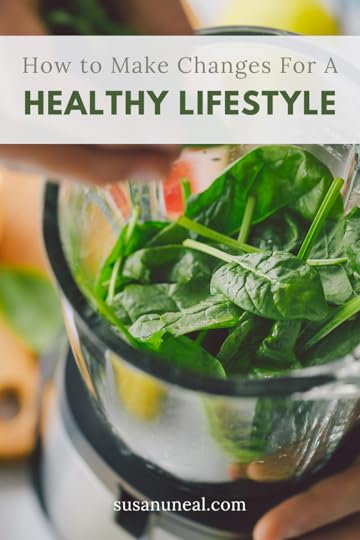
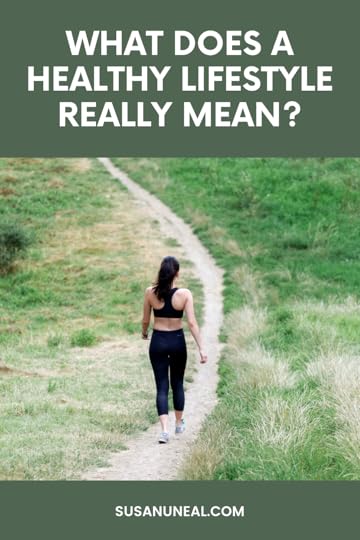
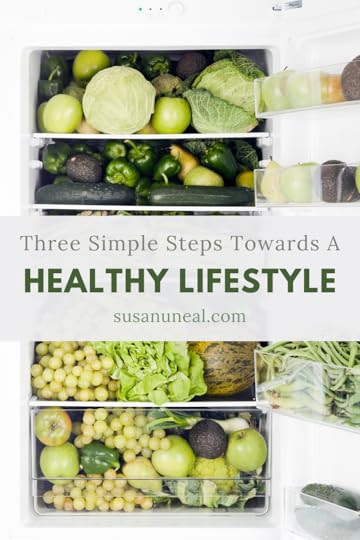 A Healthy Lifestyle Needs Mental and Spiritual Balance
A Healthy Lifestyle Needs Mental and Spiritual BalanceExercise and rest help benefit us greatly. And even with physical challenges, I believe God gave us good food to enjoy, and eating the things that help us, rather than harm us, will enrich a healthy lifestyle and contribute more balance. But even if we ate the healthiest foods available, we need more. They will only leave us temporarily satisfied if we neglect mental and spiritual balance. Every part of our body needs constant restoration to find that balance. Even our thoughts matter.
God is a faithful heavenly Father who longs to meet every need of our lives—including our physical, mental, and spiritual balance. Not only that, He cares about us, our thoughts, and what will truly help us. He wants to renew our hope, joy, peace, and trust in His faithful and unchangeable character. He offers a sweet, satisfying relationship with us, based on forgiveness and the acceptance of His Son, Jesus.
Focusing on God’s attributes and activity and truths from His Word, the Bible, I’ve tried to imagine what He might be saying about the kind of “nourishment” our bodies need—but what we often neglect the most:
My child, you enjoy all kinds of food and activities that leave you temporarily satisfied. But do you long for Me and the nourishment you need for your spiritual life? I am the One who satisfies you completely. At My banquet table, you can eat to your heart’s content, any time you wish. You can waste your time and money on things that never satisfy you, or you can sit down in My presence and relish the food I’ve prepared for you. Listen to my words daily as you open the Bible and read. Taste, and see if what My Word says is true. I will give you the strength your need to face every trying situation. Every day I want to fill you with delicious delicacies—heavenly food that nourishes you. My food adds calories to your soul, giving you protection from sin-sickness and temptation. Why would you look for other things to satisfy when I’m all you need?¹
God gave us doctors, nurses, nutritionists, and therapists to help us maintain a healthy, balanced lifestyle. And He gave us so many good foods to eat. But I believe He also wants us to center our lives and everything in them on Him. Habits of prayer, gratitude, and praise, talking to God daily, and investing time in His Word are key factors in a sweet relationship with Him. He is not only a Great Physician; He is the One who wants to satisfy us completely—in every area of our lives, including stress, disappointments, discouragement, and loneliness—anything that hinders our physical, mental, and spiritual health. Here are some of the promises He offers:
Taste and see that the Lord is good; blessed is the one who takes refuge in him (Psalm 34:8).
You prepare a feast for me in the presence of my enemies (Psalm 23:5 NLT).
“The Lord will guide you continually, And satisfy your soul in drought, And strengthen your bones” (Isaiah 58:11 NKJV).
“Let your roots grow down into him and draw up nourishment from him. See that you go on growing in the Lord, and become strong and vigorous in the truth you were taught. Let your lives overflow with joy and thanksgiving for all he has done (Colossians 2:7 TLB).
And there are so many more.
I’d love to tell you more about how our faithful, heavenly Father wants to give you physical, mental, and spiritual balance. In Day-votions® with Your Faithful Father: 90 Days with the One Who Wants to Meet All Your Needs, I’ve tried to do that. Filled with intimate prayer conversations, reflective questions, powerful truths, and even journaling pages for processing your thoughts and prayers, this book will help you discover more about God’s heart and all the ways He wants to meet the needs of your life—including the balance and healthy lifestyle we all desire.
Oh, you want to know the rest of my personal story? Like you, I will always struggle with stressful challenges in life. Some days are easier than others. I still live with fibromyalgia. But it’s 85% gone—partly because I’ve learned to maintain a healthy lifestyle with good foods, adequate rest, a positive outlook, regular exercise, and a sweet relationship with Jesus, but mostly due to God’s grace, and His amazing faithfulness day in and day out.
Because a balanced, healthy lifestyle begins with Him.
¹Prayer adapted from Day-votions® from Your Faithful Father: 90 Days with the One Who Wants to Meet all Your Needs, ©2022, Rebecca Barlow Jordan, Used by Permission, All Rights Reserved.
Author BioRebecca Barlow Jordan is a day-voted follower of Jesus whose passion is helping others find joy and purposeful living through deeper intimacy with God. A CBA bestselling, inspirational author, she has written 13 books, including Day-votions® with Your Faithful Father: 90 Days with the One Who Wants to Meet All Your Needs and Day-votions® for Mothers, winner of the Serious Writer 2021 Book of the Decade. She has also written over 2000 greeting cards, devotions, articles, and contributed to over 20 other books. From years of Bible study and teaching, she continues to paint encouragement on the hearts of others through her blog and website at www.rebeccabarlowjordan.com, visited by guests in over 170 countries. Rebecca is a minister’s wife, has two children and four grandchildren, and makes her home in Texas
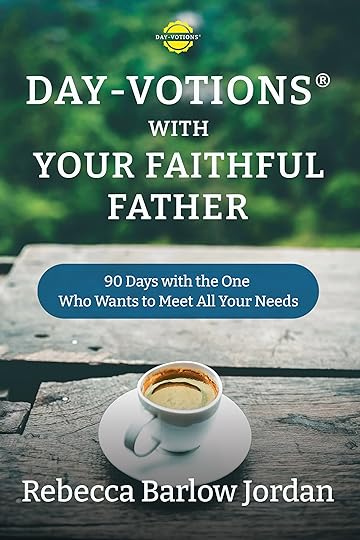

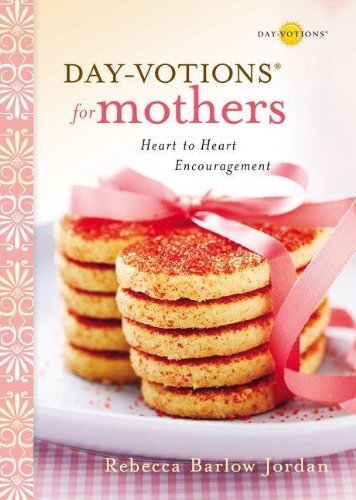 The post What Does a Healthy Lifestyle Really Mean? first appeared on .
The post What Does a Healthy Lifestyle Really Mean? first appeared on .
March 10, 2022
15 Tips for Starting a Vegetable Garden
For decades, my family and I have grown God’s wonderful food right in our own backyard. We’ve been blessed with healthy, organic, and affordable fruits and vegetables. When my husband and I moved east from Denver, Colorado, we left behind our backyard. It had matured Italian plum trees, a fabulous sour cherry tree, a productive peach tree, and a charming vegetable garden lined with cobblestone walls. When we moved, my husband and I looked at our grass-only backyard and knew it was time for a Chip and Joanna Gaines—style “fix and flip,” backyard. Here are 15 tips for starting a vegetable garden.

We wanted “zones” in our yard, to have various places to enjoy God’s creation on our quarter-acre lot. First, my husband built a pergola, where our grapevine eventually grew so large atop that with a support line, a portion stretched like an elephant’s trunk, and we could pluck grapes from our upstairs balcony.
A curvy brick lane became part of the design, along with terracing, and a koi fish pond. Fruit trees got planted. Early on, we created a vegetable garden in a sunny, twenty-feet by thirty-feet area. Three raised beds came later. Other areas in the yard included rhubarb and strawberry patches and currant and elderberry bushes. We’ve tried different spots for wandering vines such as sweet potatoes, cucumbers, and squash, as well as high climbing green beans, which have grown particularly well.
Yet more than the tasks are the spiritual joys of growing a garden. As we nurture plants and savor the harvests, our souls are nurtured, too. Yes, sometimes gardening is hard work, so it’s good to know how to pace oneself, but praying to God and being amazed by the plants He creates can make the time in the garden a great spiritual comfort. God always knows what is best for us; He made the Garden of Eden our first neighborhood. In Hebrew, Eden means place of pleasure! Of course, He wants us to enjoy gardens too!
Our Creator makes such incredible varieties of plants that are fascinating and beautiful. This year I tried pineapple sage in my herb patch for the first time. Yesterday, I marveled at the delicate red flowers that sprouted on a bushy plant. It was like it was popping up to say hello when so many other plants have bowed out for the season. Today, I stepped into our historical barn, glanced at the dried garlic, and enjoyed wrapping my hands around the stalks to pull off the garlic bulbs for winter storage.
In the garden, God gives us moments of deep soul breathing. For me, it is a rest from electronics that renourishes the soul. I thought of the antique-white garlic flowers that dotted our garlic patch months ago and how God made both the flowers at the top and the bulb underground to be delicious for healthy eating.
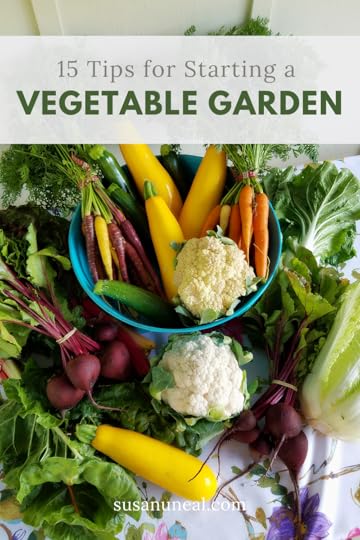
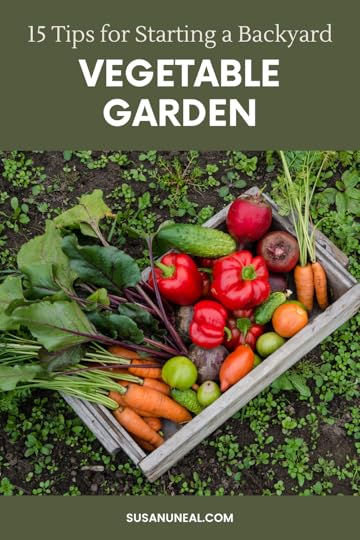
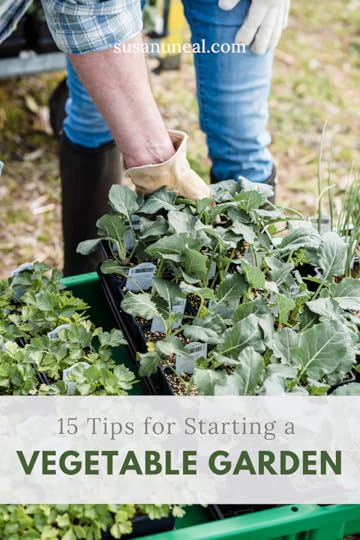 Gardening at Any Age
Gardening at Any AgeGrowing a garden for food is also a way to bless others as well as ourselves. I had a friend who cherished gardening into her nineties and was grateful to God to be productive and share her bounty with her neighbors. Because they knew her kindness, they kept a loving eye on her well-being, too. She chuckled to tell me a couple of times neighbors checked on her when she was lying down in her cornrows after her tired body had eased her to the ground.
Children can also delight in seeing seeds and saplings grow into food-producing plants and trees. Added to their fancy are the teepee-style beanpoles and yummy berry patches. During our family meals, we rejoice seeing so many ingredients from our garden. God also brightens our spirits year after year during the cold, short days of January, as we pore through colorful, picturesque catalogs to select our seed packets for the coming spring. Such signs of His creation and promise, on otherwise drab days!
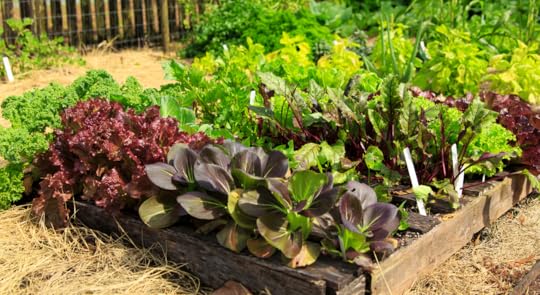
Be wise—strategize! Proverbs 3:13 says “Happy is the man that findeth wisdom and the man that getteth understanding” (KJV). I am sure God wants us to work in our gardens wisely. Part of the joy of gardening can be strategizing the labor by reducing weed pulling. For instance, besides enjoying seed planting, I chose a few vegetable starter plants, so I could plant them where I had put down a plastic weed-blocking ground covering.
Our fruit trees in Denver had given us a substantial supply of organic fruit—thirty quarts of peaches from one tree—we would have to wrestle wasps to gain peaches in our eastern backyard unless we sprayed the tree. Instead of a peach tree, we planted seeds extracted from pawpaws that grow wild in the woods near us. Yes, that’s the fruit you might remember from Disney’s Jungle Book song, “The Bare Necessities.” Being native meant they were of good promise. We had bowls and bowls of fruit from our few sturdy trees. We are also enjoying fig trees. My husband and I cherished sitting side-by-side at our wooden picnic table on a warm autumn day while we cut and cored pears for canning, thanks to a nearby abandoned pear tree. We had the joy of working together, like two peas in a pod.
Having a garden can be such a blessing, whether praying in the garden, reaching out to neighbors with produce, laboring together, or smiling and sharing homegrown family meals. A garden brings joy and a healthy lifestyle.
Tips for Starting a Garden:Start small so you don’t get overwhelmed but have several types of plants growing simultaneously, so if one doesn’t fare well, you will still have the others to enjoy. Don’t think you have to plant your whole seed pack each time. Plant enough to allow for thinning early on of the ones growing to close together. Realize that some seeds won’t sprout, but aim to plant how much you want to harvest. You want to plan your vegetables so they can be harvested at different times through the growing months, so you can spread out what becomes available to you for healthy eating. If you live in a small space, consider using clay or plastic pots that can drain into saucers. We have grown decorative and edible eggplants this way. However, pots will need more frequent watering. You might build a salad table that can include wheels so you can move it to stay in the sun or away from the sun if you live in the south. Fruits and vegetables need lots of sun. Only vegetables with shallow roots are best for a salad table. If you are unfamiliar with these, they are like a cart or wooden table with mini-garden plots. The University of Maryland at www.extension.umd.edu is a great resource for learning how to build a salad table, in their article, “Steps for Growing Vegetables in Salad Tables or Salad Boxes.”Our two favorite seed companies are Pinetree Garden Seeds (www.superseeds.com) and Farmer Seed and Nursery (www.farmerseed.com) for their small packet options and good deals. However, there are many excellent companies from which to choose.Test your soil in ample time before planting so you can enrich the soil if needed. Your county’s agricultural extension office can help you with soil test information.Make sure your garden is in an area that gets full sun. Consider starting a compost pile of vegetable and fruit scraps, eggshells, coffee grounds, autumn leaves, and grass clippings. Turn the pile every week with a garden fork (about the size of a spade), or at least once a month, so the items break down to make a rich fertilizer to improve your soil. Spray water on the pile while you are turning it. Know your gardening zone. The US Department of Agriculture website can help you determine your hardiness zone, to guide you when to plant. A common practice in our area is to plant after the last frost. However, spring seeds (such as spinach, peas, and radishes get planted earlier). Some seeds may have “volunteers” (returning each year) such as dill and the beautiful amaranth—whose early greens are delicious in the spring. In the summer, this plant towers in the garden with ornamental flowering that produces seeds that add a delightful crunch to rice and crackers. My nonagenarian, gardening friend held firmly to the advice—after planting seeds, keep the ground moist.Once seeds sprout, water gently with a watering can till stems are strong enough to have gentle hosing.Watch gardening YouTube videos to learn tips for a particular vegetation. For instance, when watering tomatoes, don’t water the leaves. How to stake tomatoes and green peppers can be helpful to see. Consider videos with advice for planting starter plants and videos on harvesting, drying herbs, and preserving fruits. You may prefer to buy your cabbage, tomatoes, herbs (such as oregano, sage, and basil), peppers, and strawberries as starter plants. We do. Depending on where you live, some herbs survive in the winter to flourish for many years. We buy our sweet potatoes as “slips” sold locally, but this year I wintered over one of my sweet potatoes by potting it for inside our home. This summer it has gone gangbuster in the garden! The plentiful leaves are edible and still available for our salads into the fall. Some crops may do best when planted mid-summer after certain garden pests are no longer a problem. We plant cucumber and squash in July for this reason. It may surprise you to learn that garlic is planted in the autumn! We plant cloves from some of our garlic bulbs we harvested.Consider taking photos of your garden at different growth stages and over several seasons. There is so much beauty in gardens, it is well worth treasuring the memories with photos. It is best to rotate your vegetables. Photos may help you remember where you planted previously so you can better plan which ones may need rotating for the next planting season. Also, draw a map for this purpose. In all your steps and stages of gardening, enjoy the blessings of praying to God for guidance, excellent results, and praise Him for your harvests! My prayer to you is that you, too, can be a happy gardener and enjoy healthy living.

If you would like additional tips please see the article, Seven Steps to Create Your Own Vegetable Garden. If you have questions about my experiences with gardening, you can reach me at heidivertrees.com, www.newSongpress.net, or Heidi Vertrees Author/Educator on Facebook.
Besides gardening, I have been an educator for many years and authored Victor Survives Being a Kid, to inspire boys and girls ages eight and up with this high-adventure fiction that’s packed with humor and compassion. Victor Survives Being a Kid is also available from Christianbook.com, BarnesandNoble.com, Target.com, and Walmart.com.
The post 15 Tips for Starting a Vegetable Garden first appeared on .March 2, 2022
Healthy Eating for Your Body, Soul, and Spirit
If you asked most people, they would say they know a lot about healthy eating and living. However, teachers and medical personnel have not taught us what healthy eating really means, because most of them don’t know either.
If you’ve been told you need to eat healthier, your first thought may have been “kill me now!”
You may think, “I only have one life. Why can’t I enjoy it with donuts, milkshakes, chocolate chip cookies, and pasta? I would rather take medicine than change my diet.” However, eating healthy does not have to be the end of all food pleasure. It can be the beginning of a wonderful relationship with food, your body, your spirit, and your emotions.

I loved rich foods, diet Coke, and had a major sweet tooth. But I was overweight, and my body screamed in pain and discomfort. Either the flu, cold, or bronchitis invaded my body at least once a year, too.
We live in a world where if you have an illness you take medicine—we don’t do preventative care, i.e., eating healthy and taking vitamins and minerals to help our immune system. Medication is not always the first thing we should go to, either.
Dr. Rebecca Freese said, “Studies have shown that exercise and nutrition can often outperform drugs in achieving health goals. Most importantly, they do it without any of the side effects with which prescription drugs are often riddled.”
God gave us beautiful food to eat. He planned the bright colors of apples, peppers, carrots, melons, eggplant, strawberries, and others to attract us to it and he created the nutrition inside it. Fruits and vegetables help our immune system and keep our body alkalinity from 7.35–7.45. Sugar, soda, white flours, pasta, and other high carb foods are acidic, causing our bodies to take the alkaline-rich calcium from our bones to maintain our bodies’ alkalinity. This eventually causes osteoporosis and osteoarthritis.
God made fruits, vegetables, nuts, seeds, grains, and meat-filled with the vitamins and minerals our bodies need to fight bacteria and viruses.
** Our bodies need vitamins A, B (especially B12), C, D, and E along with magnesium and zinc. These vitamins and minerals help prevent infections, allergies, viruses, and leg cramps.
**Too much calcium builds up on bones instead of building bone. Please get your calcium from food instead of a supplement. Foods that are high in alkalinity are key.
** For best results, don’t take a multi-vitamin, but take each of these vitamins separately.
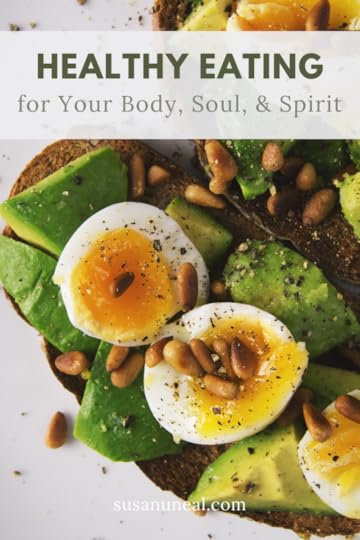
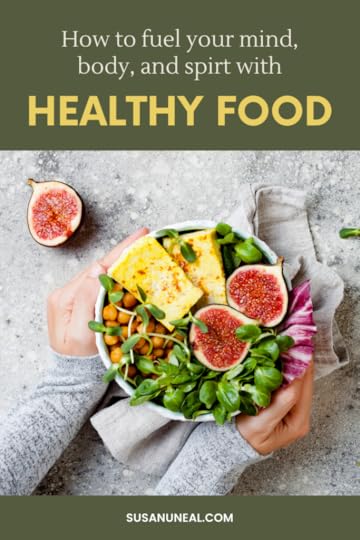
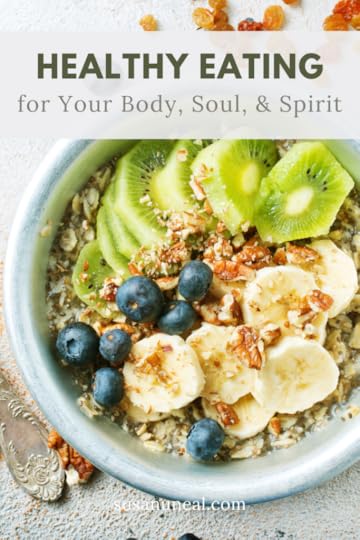 Is Sugar that Bad?
Is Sugar that Bad?Since I started a healthy diet by removing sugar and high carb grains and eating foods rich in vitamins and minerals, it helped me lose weight but stay healthier. Now, I rarely get sick.
What most people don’t realize is sugar feeds every known bacterium, virus, and pathogen in our world. Sugar feeds cancer, too. Doctors use a PET scan to find cancer in your body. They do this by introducing radiated glucose into your bloodstream. It goes right to any cancer in your body—because cancer wants sugar.
Sugar also changes our taste buds. When we eat a high-carb diet, our taste buds get used to sugar and our brain prefers the taste of sweet foods over the taste of anything else. It distorts the flavor of other good foods.
After a couple months without sugar, everything thing else began tasting better! I could not believe it. Foods I had not liked before suddenly tasted good and the sugary foods made me physically ill. I would be in so much pain from eating a donut that I could not move off the couch. This was not a one-time experience, either.
My body no longer desired the unhealthy foods I had once fed it.
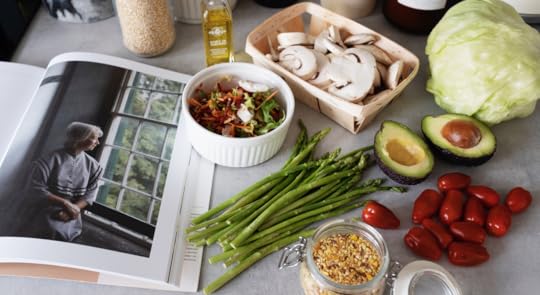
High-carb foods act like stimuli to our bodies. They give us a temporary high metabolically. What does this mean? When we eat a lot of high-carb, sugary food, our blood sugar spikes giving us energy and a good feeling—a high. The high from sugar is stronger than the high from cocaine. Sugar affects our brain chemistry—serotonin. I have seen MRIs of the brain of a person using cocaine and of a person eating sugar. They were no different. Sugar can act like a drug, as it can be addictive—because of its effects on our brains.
Sugar also spikes blood sugar, causing insulin to be released to bring blood sugar levels down by storing it. Insulin does not metabolize sugar—it stores it.
But, when insulin sends that sugar from our bloodstream to our liver, we can experience a crash. Which starts the cycle of eating to make us feel better. Doctors have also related high sugar and carb diets to anxiety and depression. If you would like to decrease your sugar consumption, check out How to Eat a Low Sugar Diet.
How Does Food Affect Us Spiritually?When we think of idolatry, we think of the golden calf the Israelites made while waiting for Moses to return from his meeting with God on Mt. Sinai. Pastors and teachers teach us idolatry is the worship of gold, silver, or wooden carvings. However, it’s more than that—and we all do it in some way.
When we eat to self-medicate or make ourselves feel better, it can be a type of worship. Idolatry is worshipping something other than the God of the Universe.
What is comfort food? It sounds innocent and, in most cases, it is. But when we use food to do what only Jesus can do—which is to give peace and comfort—then we turn food into an idol.
Our culture fills us with images and ideas of what makes life fun and exciting. Most of these images are of people loving life with lots of food, wine, and beautiful people. This is simply not true. God created us to eat a healthy diet and to like it, too. If not, He wouldn’t have given us taste buds. He wants us to enjoy the food He gave us, but He also meant it to heal us.
I know, some would say that is not true. But it is. God intended food to give our bodies the ability to resist viruses, bacteria, heal, and fortify. A healthy diet can reverse inflammation—which is the swelling of organs, joints, and blood vessels—and keep you from getting diseases and sick.
We are a temple for the Holy Spirit. Treat your body well. Give it the healthy diet it needs to live a long, healthy life. You do not need to live with pain and discomfort. Ask the Lord to direct you and the foods you eat. Ask Him to keep you accountable. I pray this year will see you living a healthier life with healthy eating.

Stephanie Pavlantos is passionate about getting people into God’s Word. She has taught Bible studies for fifteen years and spoken at ladies’ retreats. She is ordained with Messenger Fellowship. You can visit her blog at www.stephaniepavlantos.com and other social media sites at twitter @DPavlantos and www.facebook.com/stephaniepavlantos. Check out Stephanie’s Bible study, Jewels of Hebrews.
The post Healthy Eating for Your Body, Soul, and Spirit first appeared on .
February 7, 2022
5 Strategies for Food Addiction When You’re Losing Control
Are you on the edge of losing control in your battle over food addiction? Food addiction is one of the hardest things to overcome . . . I mean, we must eat. So how can you defeat food addiction when you’re losing control? Take a deep breath. Pull up a chair. Grab a cup of coffee or tea, and let’s chat about 5 strategies for food addiction.
I’m a recovering food addict. Note I said, recovering and not recovered. This battle is for life. I get it; I get you. During my year-long journey to shed 100 pounds, and while maintaining my weight loss for four years, I learned some vital lessons. I hope these tips will help you and give you hope for a permanent healthy lifestyle.

The valuable lessons I learned were recently reinforced. I share from experience and spending time in the trenches more than once during my joy-filled journey of defeating decades of obesity, binge eating, and food addiction.
Here’s the short story of how I implemented the strategies that aided me in this battle. One recent day was the absolute pits. Ever had days like that?
You know those days. I came home from a very stressful meeting, and the urge to relapse into a binge eating pattern overwhelmed me in a way I hadn’t experienced in quite a long time. Like dropping to my knees, weeping, and praying because of overwhelming circumstances. Have you been there? It’s painful, frustrating, and exhausting. And most of the time, we succumb to this overwhelm and end up binge eating and feeding our food addiction.
But we don’t have to succumb. I escaped this battle strong enough to share these strategies with you to help you win this battle day by day. Let’s prepare with these strategies for our best chance to stand! So, let’s face this battle head-on with five strategies you can begin using today.
Food Addiction is Mostly About FeelingsLet’s just cut straight to the heart of it all. Or the mindset of it all. Weight loss, food addiction, and binge eating are seated in our minds. We experience emotional triggers and must decide how to comfort our feelings.
Reflecting on thirty years of living unwell, I realize that I used food for a wide variety of feelings. Not just negative emotions, but also positive feelings . . . hey, let’s celebrate every positive thing with food, too. I was trapped in a harsh ride of the emotional rollercoaster and my excuses.
One of the best tools to process these feelings is a Feelings Wheel my therapist shared. We can use my very bad day as a perfect example of using the Feelings Wheel.
The meeting I endured left me feeling bad (the inner core feeling on my wheel). Heading out to the next layer of feelings on the wheel, I identify with the feeling of being wholly stressed after that meeting. The wheel’s outer ring moves from stressed to overwhelmed and out of control for deeper insight into my feelings. Check and check. Those feelings caused me to experience a strong urge to binge eat.
The sooner we accept that the battle for our health plays out in the mind, the better day-by-day progress we can make. Grab the Feelings Wheel for your use or find a great therapist to help you in this battle.
Ever felt bad, stressed, overwhelmed, out-of-control? How do we respond? We need some steadfast fundamentals in our journey.
Food Addiction Recovery Requires Healthy Lifestyle FundamentalsIn my health coaching, I begin with each client’s importance in making that very first choice. It’s foundational and fundamental to finding victory in this battle. Fundamental means something is a central or primary rule or principle on which something is based.
Do you want to live healthily? You’ve got the resolve to make these changes––it’s time to define your fundamental reasons for this journey you are on.
Spend some time examining your motivation and reasons for pursuing a healthy lifestyle. Consider your why? Journal about it. Get creative. And use this time of reflection to be fundamental to your goal setting. Goals keep you accountable. Always have your goals established for future evaluation.
Fundamentally, we can’t arrive where we don’t know where we are going. Knowing where we are going and making progress day-by-day creates momentum, and momentum is fundamental to your goal of a lasting lifestyle transformation.
If you would like to read more about food addiction see, 5 Reasons Binge Eat and Are We Addicted to Sugar and Carbs?

After thirty years of following the standard American dietary advice and living in morbid obesity, I finally discovered the truth that I had severely damaged my metabolic health. I did not know I was carbohydrate intolerant. Now, not everyone is as carb sensitive as I am, but it was mind-blowing to discover a new concept and a new way of eating to fix my chronic health issues.
What I learned through adopting a low-carb diet changed my life forever. As I continue this path of healthy eating for my metabolism, I will never risk damaging my health again by returning to a high-carb diet.
I discovered a few essential concepts: sugar is highly addictive, and factory processed foods are loaded with sugar to keep you addicted and come back for more! Physiologically, we are trapped in this vicious cycle as our brains scream at us––feed me more sugar!
When I landed on the number one website in the low-carb community, Diet Doctor, I learned we could fix our health with a healthy diet. I need a low-carb and low-sugar diet; you might need a gluten-free diet––but it’s essential to understand that our food choices have the most significant impact on our physical health.
As I felt better physically, my emotional and spiritual health improved significantly. The right food choice for you will help heal you in body, mind, and spirit. Being healthy and whole in your entire being is the best weapon for overcoming your food addiction.
Food Addiction–Through Fasting Comes VictoryIf you ask me what the most crucial strategy or tool in my victory over food addiction is . . . hands down, my answer is fasting. Hear me out.
Fasting is the best gift in a healthy lifestyle. I discovered the hard truth that we are not designed to eat around the clock. Eating around the clock left my metabolism, experiencing blood sugar highs and lows all day, every day. The result was the intense desire to eat around the clock. Fasting helped me break this vicious cycle both physically and mentally.
Fasting can be a key component in breaking your food addiction as we teach our body (physiologically) that we do not need to be fed sugar all day long. Fasting helps move our metabolism from chronic sugar burner to fat burner. You can learn more about getting started with fasting on this blog: A Beginner’s Guide to Intermittent Fasting.
Even more than the physical and emotional benefits of fasting, the spiritual aspect is Biblical and will increase your faith––which is the final strategy I use.
Food Addiction is Winnable with FaithMost importantly, your faith must be the most critical weapon in your arsenal. Back to my story of that bad, stressed, overwhelmed, and out of control day.
Paul writes about my losing strategy in Ephesians 2:3, All of us also lived among them at one time, gratifying the cravings of our flesh and following its desires and thoughts. Like the rest, we were by nature deserving of wrath.
I acknowledge this history––I craved all the wrong things to satisfy my soul! I never read my Bible daily or with passion. Incredibly, God flipped the cravings of my life, and my entire being craved nourishment from Him as my primary source of fuel.
So, on this recent day, how did I respond?
First, I took a deep breath. I mentally went to my new strategies fast. I grabbed my Feelings Wheel. I identified those feelings of bad, stressed, overwhelmed, and out of control. I knew I was on the brink of losing control.
On this brink, I run to one of my favorite Scriptures found in Psalm 63:1. David knows this deep longing in his soul: You, God, are my God, earnestly I seek you; I thirst for you, my whole being longs for you, in a dry and parched land where there is no water

Friend, run! Run to your faith. Run to Scriptures that speak of self-control and making wise choices in your journey.
Sometimes we need a melt-down moment. That day I wept bitterly. I journaled. I pleaded with God to take away this urge to drown my sorrow in a binge. I took time to work this out with Him.
Then I got up, distracted myself with some household chores, and a phone call to an encouraging friend. A few hours later, I finally sat down with a cup of herbal tea and breathed a huge sigh of relief. A little weary from the battle, but satisfied by the outcome. All glory to God!
For many years I succumbed to these scenarios. I know you can relate. Thirty years I craved all the wrong and fleshly things, leading to my food addiction and episodes of binge eating. Friend, we don’t have to live like this.
You, too, can be fully satisfied by trusting God to care for every need and longing in your heart and soul. God is Jehovah Rapha (healer) and Jehovah Jireh (provider). He cares about your healthy lifestyle in body, mind, and spirit.
These strategies will help you claim victory over your food addiction and beat back an upcoming binge eating episode. From feelings to fundamentals, use food choices and fasting while relying on your faith. Repeat when and how often and necessary!
About the AuthorChristine Trimpe is a former casual Christian, now passionate about Christ, coffee, and connecting with you. Christine’s transformation story and victory over obesity and chronic illness of her body, mind, and spirit will inspire you to strengthen your own joy-fueled adventure with Jesus. She’s been where you’ve been, where you are, or where you want to be through seasons of trials and triumphs. Whether you need physical, emotional, or spiritual healing, she encourages you to delight in God’s Word daily for lasting life transformation to step up and into God’s calling in your life. Her latest release is Seeking Joy through the Gospel of Luke. Learn more about Christine’s writing, speaking, and coaching at ChristineTrimpe.com.
Pin for Later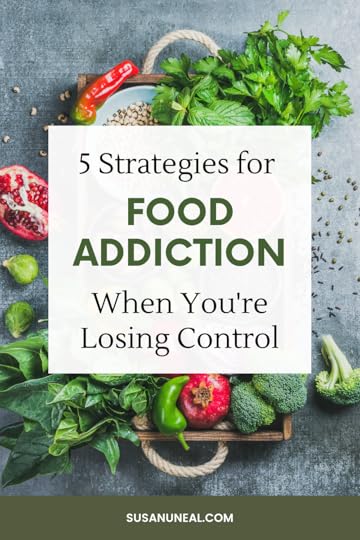
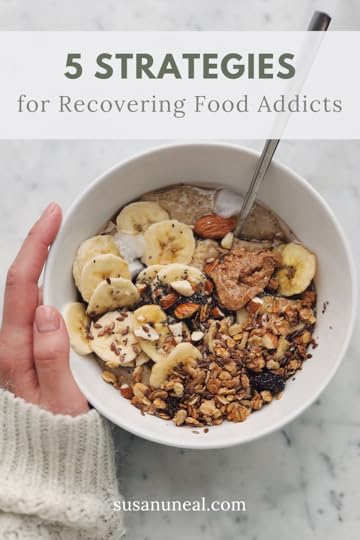
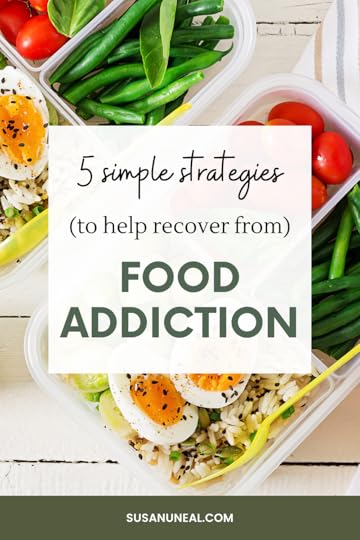 The post 5 Strategies for Food Addiction When You’re Losing Control first appeared on .
The post 5 Strategies for Food Addiction When You’re Losing Control first appeared on .
February 1, 2022
How to Walk and Multitask at the Same Time
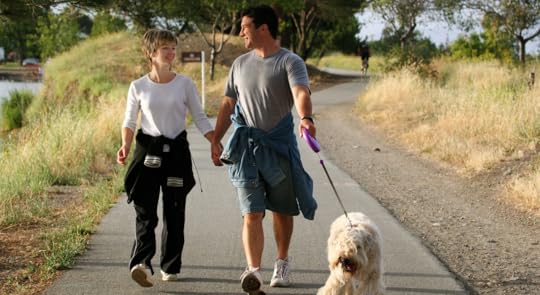
Have you used excuses to keep you from developing a healthy lifestyle with regular exercise? I did. I couldn’t see how I could add in a daily walk to my busy schedule until I learned how to walk and multitask at the same time. Now I get healthy and mark items off my to-do list at the same time!
My brain knew how vitally important an exercise plan was for my life, yet my head convinced me I had too many other irons in the fire to follow through with an exercise regimen consistently.
“I don’t have time to walk.”
“I’m too busy to exercise.”
“I have too many other responsibilities to take time to walk.”
However, when my daughter’s boyfriend proposed and set the wedding for ten months later, I knew I had limited time to lose unwanted (and unhealthy) pounds that I’d slowly added over the last couple of years. Also contributing to my motivation—my active, two-year-old grandson prompted my desire for more energy and stamina. I knew I needed to get healthy, for my sake, as well as for those I love that I wanted to spend quality time with.
How Will I Find Time to Walk?I don’t work outside the home, but I do work full-time as a journalist and author. (Well, the clock shows full-time … the paycheck doesn’t necessarily reflect “full-time status,” but I certainly enjoy what I do.) Between my writing and managing the home, I always felt like something needed my attention.
Laundry.
Dishes.
Meals.
Pets.
Hubby.
Adult kiddos.
Grandson.
Writing deadlines.
Brainstorming time for new writing projects.
Books to read for pleasure and research.
Phone calls to family members or friend.
Not to mention … time with the Lord.
I didn’t see how I could add in a daily lengthy walk to my busy schedule. Yet my brain kept reminding me of the benefits of walking.
Benefits of a Daily WalkIn an article on the MayoClinic.org site, found here: https://www.mayoclinic.org/healthy-lifestyle/fitness/in-depth/walking/art-20046261, a hefty list boasts these benefits of a daily, brisk walk:
* maintaining a healthy weight
* losing body fat
* preventing or managing heart disease, stroke, high blood pressure, cancer, and type 2 diabetes
* improving cardiovascular fitness
* strengthening bones and muscles
* increasing energy levels
* improving mood
* improving cognition
* improving memory
* improving sleep
* improving balance and coordination
* strengthening the immune system
* reducing stress
*reducing tension
* boosting spirits
* staying strong and active.
The benefits of walking definitely outweigh all of my excuses!
Lace-up the Shoes and Put on the Multitasking CapeI knew I had to buckle down and start walking! I just had to decide what to cut from my schedule in order to fit it in. Then it dawned on me that perhaps I could multitask while I walked. So many of the items on my “to-do” list for each day could be performed simultaneously with my walks.
When I realized how many bullet points on my to-do list could be marked off with my walk, I felt more motivated to head out the door each morning. Here are a few of the tasks and responsibilities I added to my walks each day.

One of my very favorite spots to pray is my front porch swing. For a long time, I’ve loved singing and praying out loud. Something about being outside in God’s creation makes me feel much closer to Him. Well, I figured out quickly that walking with the beauty of God’s creations surrounding me gives me those same close feelings. And got me moving, too.
I stay focused more on my prayers when I talk aloud to God. My mind wanders when I pray silently … to my grocery list to thoughts of “what’s for dinner?” to thoughts about the kids…anything but the Lord. Talking out loud to God, as if He’s right next to me, keeps my thoughts on Him.
I’ll admit, I often feel a tad embarrassed when a neighbor drives by and I appear to be talking to myself, so I stuffed earbuds in my ears to give the impression that I’m listening to music. But, most of the time, I just chat away to the Lord, without a care of who might pay attention as they drive by.
My prayer time is my first priority when I walk in the morning. And, according to the needs of my friends and family and world in general, those times with the Lord can often last over an hour. I start with praise, seek forgiveness for my transgressions, thank Him for His gifts (and I try to be really specific with my thanksgiving!), and then I move on to my petitions.
And, on those days when I have lots on my mind, while I walk and tend to be easily distracted by the new baby calves in the field or the bluebirds flitting on the power lines or the Canada geese flying over in V-formation, well, then I just tell the Lord, “I’m sorry I’m distracted today and seem to be rambling, but, my prayers are sincere, God, and I’m thankful You hear every word uttered from my lips and from my heart.”
2) Administrative Assistant TasksMy prayer time usually dominates my early-morning walk. When I come to that point in the day when I need to make phone calls—either to check on my aging mom, one of my adult kiddos, or one of my siblings or if I need to schedule a doctor’s appointment or call about an insurance question that I expect to be on hold for an extended period or when I want to check on a sick friend or catch up with a long-distance friend going through chemo or whatever else might occupy my time on the phone, I lace up my shoes and head out the door again. I put the phone on speaker, so that I can pull up my calendar if I’m making an appointment or check a correspondence in my email, and I chat away. It always helps me to keep a running list of “calls to make” in the notes section of my phone. That way, if someone doesn’t answer my call or one call goes quicker than I expected, I check my list for another call to make.
3) Reading TimeAs writers, we’re reminded by “those in the know” to read often in our genre, as well as other genres, to improve our writing skills and enhance our creativity. But, as much as I love reading, it always seemed to get pushed lower on my priority list when I needed to fold clothes or cook a meal or do the dishes. Reading felt like “frivolous” time, because I enjoyed it so much. But when I combined it with my afternoon walk, I didn’t feel guilty for “just reading” instead of accomplishing something else on my list.
I downloaded the app from my local library and check out audiobooks for free. Then, I let my phone “read” to me as I walk. I’ve marked so many to-be-read books off my list while adding steps to my daily walk!
4) Podcasts and Sermon Catch-upI’ve often used my afternoon walks to catch up on a sermon I missed or to listen to another sermon for the week. I tune in to podcasts that I wanted to enjoy but seldom took the time away from my day to listen to an entire episode.
5) Brainstorm SessionBefore I added multitasking to my walking sessions, I often curled up in my recliner or sat at my kitchen table to plan my menu for the week, brainstorm a new writing project, or organize my thoughts for my spring cleaning projects. Now, instead of planning in a sedentary posture, I grab my fully-charged phone and head out the door, laces tied up yet again. I clear my head of other thoughts and brainstorm writing ideas. When something piques my interest, I use talk-to-text to jot down my thoughts in the notes section of my phone. Or, I use talk-to-text to send myself an email. I follow the same pattern with my grocery list or menu plan or cleaning agenda.
6) Quality Time with My HubbyI talked my husband into joining me for evening walks. We eat a light supper when he gets home from work, give our food time to settle, then head out the door for a walk together. We use this time to catch up on his day and mine. Or to catch up on the latest news about our parents, siblings, kids, or friends. We make plans for our next date night or out-of-town trip. Or revisit our budget for the year.
Before we started our nightly walks, we often had these same conversations … while the television blared in the background, or we did dishes together, or while my face was turned towards the computer. Admittedly, we weren’t always focused intently on our conversation, because we were … multitasking. But when we turned that multitasking around, and combined our conversations with walks, then we could focus completely on each other without distractions. (Unless an owl flies over or my biologist-husband spots a luna moth or he needs to point out a constellation. But, those are fun distractions.)
On those rare times that we run out of things to talk about, we’ve often enjoyed a sermon together or listened to a praise song playlist or tuned in to our favorite radio station app. We’ve facetimed our grandson frequently on our walks or called one of the kids on speakerphone so that we could chat together. With limited time at home following a long workday, my husband enjoys the multitasking, as well.
Multitask it Your WayAs a disclaimer, I recognize that my walking and multitasking schedule will look different than yours. I’m in a season of empty nest, with my adult kiddos out of the house. And, I work from home. Your lifestyle may look much different or just slightly different. But, I hope I’ve encouraged you to devise a plan that will get you excited about walking daily, while fitting in tasks from your to-do list with each walk.
I no longer dread my walk each day, with feelings that I’m taking away much-needed time from other responsibilities. Instead, I make it a game to see just how much I can accomplish while I’m walking. I no longer say, “I don’t have time to walk.” Instead, I ask, “What all can I get done today during my walk?” I hope you’ll consider a brisk, daily walk to lead you on a journey to a healthy lifestyle. And mark off those items on the to-do list at the same time!
About the AuthorJulie Lavender is a journalist and author and former homeschool mom of four kids. She is married to her high school and college sweetheart, David, and enjoyed following him all over the country as the wife of a Navy preventive medicine officer. Julie is the author of 365 Ways to Love Your Child: Turning Little Moments into Lasting Memories (Revell) and Children’s Bible Stories for Bedtime (Zeitgeist/Penguin Random House). Julie is excited that a Focus on the Family Broadcast interview aired in early January, and she’d be honored if you’d tune into the Focus on the Family YouTube channel to listen. Connect with Julie on social media and at https://www.julielavenderwrites.com.

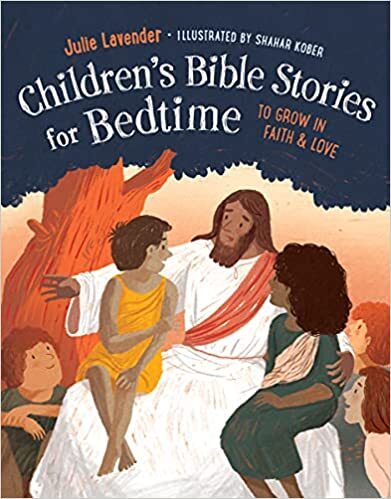 Pin for Later
Pin for Later

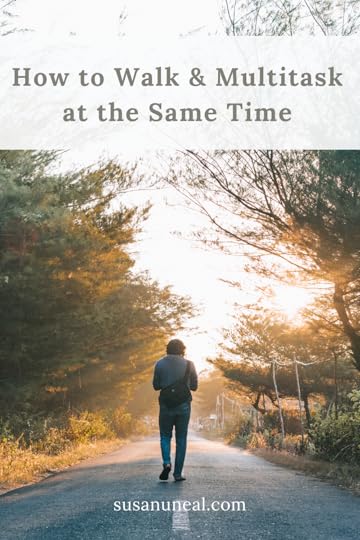
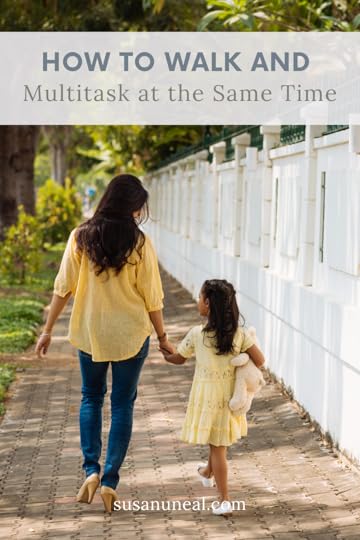
The post How to Walk and Multitask at the Same Time first appeared on .
January 17, 2022
5 Steps for Building a Healthy Relationship
If you are like most people, you aren’t certain what healthy relationship characteristics are, and you might not even believe healthy and fulfilling relations exist. Have you taken steps towards building a healthy relationship? You strive to be the best version of yourself through eating a healthy diet, exercising, and getting necessary sleep. However, you also need to assess whether any of your relationships are toxic.

Now is the period to evaluate your life. It’s the beginning of a new year and time to set goals. It’s also a wonderful time to assess and improve your relationships. Evaluation and reflection of your relationships are important when you are polishing your life.
Some people love to set and achieve goals. For other people, establishing goals is like a modern-day torture device. Americans set goals for their finances, working out, making better decisions, weight loss, decreasing stress, and…on-and-on it goes. Many people reach their goals while more individuals give up their aspirations before the end of January. You must have goals to achieve the life you want.
While you are evaluating your life and goals, examine your relationships. Do they drain your energy or increase it? Are they helpful, supportive, and safe? Do they bring you joy? Here is a blog to help you find your joyful place https://deedeelake.com/your-joyful-place/.
This is the perfect moment to investigate all of your relationships to see which ones matter and have the potential to be toxic. Some relations have an expiration date, while others are lifelong commitments. You may have a great health routine, but if you have destructive associations, they can destroy the good things in your life.
Evaluate and improve your relationships just as you do the other aspects of your life. Great ones share common healthy characteristics. Here are five steps to create better connections you can implement right away.
5 Steps to Create Better, Healthy RelationshipsDecide if your relationship is a priority over other things vying for your attention.Be polite—it’s the trivial things that build up over time.Be kind and loving to your significant one more than to anyone else—they deserve it the most.Invest your time learning how to grow your relationship into one you’ll be proud of years from now.Let go of past wounds and live in the Now! It’s 2022, so anything is possible!Choose Healthy LivingYou choose how and what to eat. You choose to sleep and exercise. It is possible to choose to create healthy relationships, too. The first step is changing the way you think. Just as it states in the Healthy Living blog Peace of Heart and Mind. “Healthy thinking is vital for healthy living.” A healthy mind is crucial to obtain a strong bond with someone else. When we think negatively of our loved ones, all we can see and focus on is their flaws. See your loved ones through the lens of healthy relationship characteristics and you can see the good, lovely, beautiful in them.
In the article, Emotional Health, it states, “Oftentimes negative emotions are usually accompanied by an underlying root issue that needs to be identified and yanked out to maintain emotional health.” You can’t experience an extraordinary bond if you aren’t willing to be truthful and do the challenging work to clean uproot issues. The ugly past hurts. In a committed relationship, you owe it to yourself and the one you love to put in the time to discover the root problem that blocks you from achieving the dynamic, loving connection God designed.
Choose how you want to live. When you decide to put your relationships first, you will see them blossom. It is up to you to decide how you will live and exactly what you will accept from others. Most people will respect your decisions, especially when you express and stick to them. Be sure to put time with your sweetie on the top of your to-do list. It’s vital for a healthy relationship.

Treating others with kindness, love, and politeness creates extraordinary relationships. Being polite is free, and the investment of kindness grows exponentially throughout your life. Loving your partner more than yourself will always be a wise investment. That doesn’t mean for you not to take care of yourself. A healthy lifestyle is important for healthy relationships.
Keeping our emotions in check is essential. Personally, being of a very enthusiastic nature, this is an area I’ve had to learn the hard way. Donald Miller, author of Business Made Simple has brilliant advice. “The truth is none of us has to be a slave to our emotions. Our emotions do not have to become actions.” Emotional health goes a long way in creating extraordinary relationships. You can learn to control your emotions while still being the passionate person God created you to be.
Invest in Yourself and the Ones you LoveImproving your relationships looks much like other ways you’ve learned things in your life. To get into college, you had to graduate with good grades from high school. From college, you’ve probably learned many other things. You invested your time, energy, and money into learning. The same is true for relationships. You can’t expect to just “know” things. You’ve got to learn and experience them. You give honor and show respect to your loved ones when you invest in them by learning to be the best you can be!
If a person has never experienced a loving, healthy, God-centered life then how can we imagine they will recognize the signs of trouble in their relationships? When we choose to walk beside our neighbors, friends, and loved ones as they grow in their relationships, we can guide them. We can mentor when the troubles are squabbles and not warlike situations. We need to be willing to roll up our sleeves and create dynamic, extraordinary, and loving relations. They don’t just happen. “Happily, ever after is not a fairy tale—it’s a choice.” Fawn Weaver
Domestic ViolenceOften, it is the trivial things that can trigger an argument. It Ephesians 4:36 it says, “In your anger do not sin. Do not let the sun go down while you are still angry” (NIV). This is the wisest advice you will ever hear. If you resolve situations before they blow up into something bigger, it is so much easier to sleep and have peace with your loved ones. Forgiveness is for you, not the one you are forgiving.
You may not realize there has been another casualty of the 2020 Pandemic—family relations. Time Magazine reported in DV Pandemic within a Pandemic. “While one in three white women report having experienced domestic violence [during the pandemic], the rates of abuse increased dramatically to about 50% and higher for those marginalized by race, ethnicity, sexual orientation, gender identity, citizenship status, and cognitive physical ability,” says Erika Sussman, executive director of the Center for Survivor Advocacy and Justice (CSAJ), a support and research organization.”
It’s important to notice those around you or if you are in a domestic violence situation, please get help. Bright Horizons is a shelter and advocacy group for people who experienced domestic abuse or sexual violence. They are there to help when you or someone you know needs it. It takes a village to raise a child. It takes a village to grow healthy relationships.
[image error]
Healthy Relationship CharacteristicsWhat do healthy relationships look like? Would you know one if you saw it? I know most people think they are as rare as a unicorn. I promise, they do exist.
Let me leave you with the following list of healthy relationship characteristics. Work every day to implement these characteristics into your life and you will see a beautiful difference all around you.
TrustHonestyHumorKindnessJoyPurposeCommitmentLove expressed in many ways“Sexiness wears thin after a while and beauty fades, but to be married to a man who makes you laugh every day, ah, now that’s a real treat.”
—Joanne Woodward
About the AuthorDeeDee Lake, The Connection Expert—speaker, author of Next Step. You’ve Accepted Jesus. Now What? blogger, and columnist—builds relationships one conversation at a time using humor, storytelling, and purposeful communication. The owner of Cherish Relations Retreats, she lives out her faith and passion while writing, speaking, and guiding individuals on how to have extraordinary relationships. www.deedeelake.com
Pin for Later
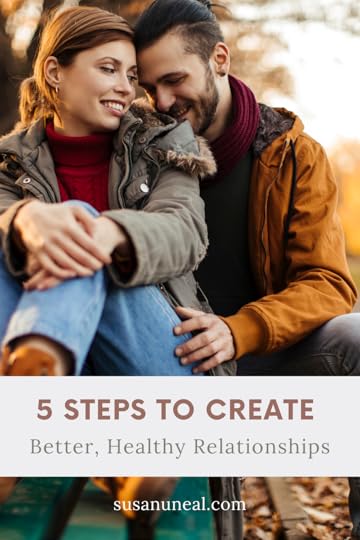
 The post 5 Steps for Building a Healthy Relationship first appeared on .
The post 5 Steps for Building a Healthy Relationship first appeared on .
January 6, 2022
Physical, Mental, and Spiritual Ways to Reduce Anxiety
People suffer from various kinds of anxiety, and it often gets unbearable around holidays or special occasions. I used to be one of those individuals. When anxiety seized my mind, I felt the creepy-crawly rush of heat enveloping my body, buckling my knees to the point I felt like I would pass out. All I could do was get out of where I was or find the nearest chair to sit down. When caught in the throes of anxiety, it is hard to think and know what to do. I felt shame at not measuring up. It helped me to examine my feelings. It may help you to examine yours. Don’t try to talk yourself out of what you are feeling. On the contrary, give yourself lots of permission to feel. In this blog, we will explore ways to reduce anxiety naturally.

Look at your eating habits. Do you drink a lot of caffeine products, such as coffee or soda? If yes, cut back on them? I was a sugar addict and didn’t even know it until confronted by a healthier friend on a low-sugar diet. Sugar may calm anxiety momentarily, but then it sends your body into orbit.
Do you smoke cigarettes? Nicotine is addictive, and its side effects of it are dangerous for your heart, hormones, and gastrointestinal system. Once addicted, it creates restlessness and anxiety that requires more nicotine. The cravings can be intolerable.
Are you getting enough exercise? Research shows that a daily exercise routine and doing something you love reduces pressure. Walking, running, dancing and weightlifting are all ways to reduce stress, especially if you give yourself positive messages while you are doing them. Too many of us are good at putting ourselves down because of negative early family messages.
On the other hand, being complimented so much by well-meaning parents may have caused a subconscious fear of messing up and letting them down. How hard do you work? Are you a workaholic? Or do you not work at all because of fear of failure?
Are you able to sleep, or do you let yourself worry and think all night? There are ways to take care of an overactive mind. One way is to pray. Reciting a favorite Bible verse will shut out nagging thoughts because your mind can only handle one idea at a time. Or you could concentrate on your breathing. Andrew Weil MD is a master of breathing techniques, and you can find his videos on YouTube. They’ve been extremely helpful to me.
Mental Ways to Reduce AnxietyWhat kind of messages are you telling yourself? The way you talk to yourself can increase anxiety tenfold. Negative self-talk is destructive and can keep you in a constant state of anxiety. To combat the negative messages you give yourself, you must change the negative into a positive. Say something positive about yourself five times each time a negative thought comes up.
Here is an example: if you look in the mirror and say, “I look terrible.” Overcome that by saying five times in a row, “I look great, I am beautiful (handsome). I am better looking today than I was yesterday.” For best results, do this often. When someone asks you how you are, say, “I get better every day.” Whatever you tell yourself is true. If you say you can’t do something, then you can’t. If you say you’re not good enough, you will prove that you are not good enough. If you say you don’t like something, you won’t like it even if you never tried it.
Do you journal? Writing everything down is a positive way to put things into perspective. Journal every day, hold nothing back. Don’t worry about spelling or making sense as no one is going to read this except you. Do not read what you have written for several weeks. When you read it, you will see a predominant theme that will guide you in decision-making. Many people avoid writing because it is “too much work.” If this is you, you could dictate into the notes app on your smartphone.
Have you or do you often feel that you are crazy? If you are reading this, you are not crazy, and in fact, probably everything you think is normal and felt by hundreds of other people.

Do you have a spiritual component in your life? If so, what do you do to honor it? Everyone must have someone or something in their life that they can look up to. If you don’t know God, perhaps now is the time to explore who He is and what He stands for.
Have you tried meditation or yoga to calm yourself and relax? Meditation and yoga are widely accepted as excellent ways to combat anxiety. Are you suffering from shame or guilt passed on from parents or others? If so, how long do you want to carry it? Have you sought counseling or spiritual direction from someone you trust? Is misery a companion that you are willing to give up? Are you ready to do whatever it takes to find peace of mind?
Some people have used anxiety as a crutch for many years; giving it up involves facing your reasons for keeping it. Just like leaving an abusive relationship opens one up to a whole new world, so can leaving your anxiety. Are you willing? Are you tired of being controlled by it? Only you can answer these questions. Help is available through many of the modalities mentioned above. Create a plan for how you will deal with your anxiety and stick to it.
About the AuthorEvelyn Leite has had a successful, 35-year career as a professional counselor and author, focusing on drug and alcohol problems and mental health issues. Among her best-known works besides the “Blood, Sex and Tears” series are Women: What Do We Want? and A Fix for the Family Rift Caused by Addiction.” She’s a 2008 inductee in the South Dakota Hall of Fame. She can be reached at http://www.Evelynleite.com.
Pin for Later [image error] [image error] [image error] The post Physical, Mental, and Spiritual Ways to Reduce Anxiety first appeared on .December 21, 2021
Peace on Earth? How to Keep the Holidays from Stressing You Out
The holidays can be a stressful time of year. We try to accomplish too much in too little time. Here are some tips on managing holiday stress.
Christmas To-Do ListHow are you doing on your Christmas to-do list?
Are all your gifts bought?Did you buy the perfect present for each person?If you had to ship them, did they make it to their destination or are you still worrying about that?Did you cook all your family’s holiday favorites?How about those recipes you saw online or gracing the cover of a magazine? Did you cook them, but they didn’t look like the picture, and didn’t taste that great either?Have you been running from one commitment to the other-–holiday parties, children’s special performances, church activities?Did anyone in your family get sick?What about Christmas cards? Did you send one to everyone you should have? Did you write a personal note on each?Were your decorations perfect-–the latest trend? Or did the lights go out, the cat knocked your ornaments off, and the toddler ate pine needles?Did you overeat? After all, you have to taste everything you cook and all the delicacies at the parties you attend, just to be polite, right?Did your car or an appliance break?Have you had trouble sleeping, lying awake trying to remember everything you were supposed to do?Do you just wish you could go away to somewhere remote and tropical and relax?
Side-Effects of StressIt’s easy to get stressed out during the holidays. We try to do everything and do it perfectly and we wear ourselves out in the process. But this is normal, right? What’s a little extra stress? Well, actually, stress can be more harmful to our bodies than you may realize, as these are a few of its side-effects.
Headaches-–stress can cause headaches or make them worse.Heartburn—an increase stomach acid can cause heartburn.Heart stress-–stress increases your pulse rate, which puts extra stress on your arteries. This can lead to heart attacks.Blood pressure increases, which affects your heart, as well as other organs.Insomnia-–difficulty sleeping; therefore, you get less rest than your body needs.Immune system lowers, which makes you more susceptible to catching colds, flu, etc.Blood sugar elevation–-stress causes your liver to release more sugar (glucose), which over time can lead to type 2 diabetes.Shortness of breath-–stress can cause the muscles that help you breathe to tense up, making it more difficult to catch your breath.Backaches-–tense muscles can make your back ache.Stomachaches-–stress can make your stomach hurt and give you nausea or diarrhea.Hormone disruption—stress can interfere with your hormones and cause menstrual cycle abnormalities or low sex drive.Fatigue increases with stress.Tips for Managing Holiday StressSo how do you get everything done without the stress and its negative effects?
Make a to-do list, prioritize it, and put a date by each item. Be realistic about how important the activity is and how much time it will take.Don’t try to keep up with all the latest trends or the neighbors. Be thankful for what you have and accept your own traditions as being enough.Give yourself permission to not do something. You don’t have to go to every activity that’s scheduled for the season. It might be nice to attend the tree-lighting in the square, but unless this is a tradition your children expect, you could skip it this year. And don’t feel guilty about not doing something!You might need to have a discussion with your family about the first three things and let them know that everyone in the family will be happier when you are less stressed. Let them help decide which things are really important to them and which things they can do without.
Take a breather. Go for a walk. Listen to soothing music.Get a massage.Go to a yoga or Pilates class. If you can’t do that, do some slow stretches at home.Try to maintain a healthy diet as much as possible. You don’t have to eat everything that’s offered.Take a good multi-vitamin and maybe add extra B12 and vitamin C.Focus on family, not things.Take a few minutes each day, preferably before you get busy, to read a devotion and spend time with the Lord.Focus on the true meaning of Christmas, which was not hurried, busy or fancy. Jesus was born in a humble way, and the only people on Earth who knew about it were a few shepherds, wise men, and his parents.I remember when my children were preschoolers, and I ran around town all day trying to expose them to all the Christmas experiences that were available, from the Festival of Trees to seeing Santa at the shopping mall. Everyone, including myself, was tired before the end of the day when my oldest son, who was about five at the time, said, “Where’s baby Jesus?” I stopped dead in my tracks and thought of all we had done and everywhere we had been, and you know what? The baby Jesus wasn’t in any of it. The reason for the season was missing. I vowed to myself to make sure that never happened again. So when we went home that evening, we had a little visit with our humble nativity scene. I affirmed that Jesus was indeed the most important part of Christmas, and all those other things were just extra.
Perhaps before you do anything else, pray. Ask God to help you stay calm and focused on what is important and do your part to have peace in yourself, your family, and your little corner of the world.Merry Christmas and may the Peace of God sustain you throughout this holiday season!
Marilyn Turk writes historical and contemporary fiction seasoned with suspense and romance. She also writes for Guideposts Magazine and devotions for Daily Guideposts. She and her husband are lighthouse enthusiasts and have visited over 100 lighthouses. Check out her newest release, Abigail’s Secret. She’d love to connect with you on social media or her website: http://pathwayheart.com.
The post Peace on Earth? How to Keep the Holidays from Stressing You Out first appeared on .December 17, 2021
A Beginner’s Guide to Intermittent Fasting
Have you ever seen a guide to intermittent fasting and are convinced it is not for you? Yet, have you struggled with how to lose a few pounds (or more) and been discouraged by low-sugar, low-carb, gluten-free diets? People living in western cultures know the struggle. So many tasty morsels of food call our names, and they are often the products most available. Sugar and processed foods are making us sick. Why do we indulge then? How can we overcome this never-satiated habit, which provokes us to repeat-repeat-repeat though we know we should resist?
I have often chastened myself for being a “carboholic.” I love carbohydrates, and they love me back with extra pounds and fat where I don’t want it. I believe there is a science-based way to achieve health benefits besides constantly scolding myself for eating a “bad-for-you-food,” or experimenting with one diet after another. I studied and successfully applied the principles of intermittent fasting along with a healthy diet and achieved exceptional results. Many benefits are evident, even when the bathroom scale doesn’t reward me.

Most people innately desire good health and an active lifestyle. The alternative doesn’t lend itself to positive outcomes, physically or mentally. In addition, Scripture declares we are the temple of God’s spirit in I Corinthians 6:19. Those who follow the Lord are his light-bearers and choose to invite Him in so we can use our lives to honor him. Then, what is the disconnect? It’s a fact that many Christians are overweight and consequentially unhealthy. So what can we do?
As recognized, many stress factors during the COVID pandemic created a national weight-gain crisis, compounding the pandemic’s consequences. Obesity is a co-morbidity of Covid-19, so those who were already overweight further increased their risk. As detailed in this post, How to Shed Your Pandemic Pounds—5 Weight Loss Tips, we learn more about the impact. Because of my battle with weight gain during the lockdown, I became fascinated with research about intermittent fasting. I tried to turn my habits around with a firm resolve to diet, with minimal and sporadic success.
Why Diets Fail versus Life Eating PlansOften a dieting cycle leads nowhere, like a gerbil running on his wheel. Only at least for the gerbil, he gets exercise. The science behind the failures caused by “dieting” is compelling. Diets can help people to lose pounds, but then, after going off the diet, people regain those pounds or perhaps even more. There is a biological reason for this insufferable pattern.
It is not a simple matter of eating less and exercising more. Our bodies are amazingly sophisticated, created with a built-in protective mechanism in case of real starvation. When we drop our caloric intake, our metabolisms slow down. That means we stop efficiently burning the calories because our bodies are reserving fuel/energy to maintain life in the presumed crisis state. Your body doesn’t know you may be interested in getting into a smaller size of clothes instead of surviving a famine!
The consequence of lowering your calories is that the resting metabolic rate (RMR) also slows down. When you lose weight, your body increases your hunger hormone and decreases your satiety (satisfaction) hormone. Don’t be angry with your body. It’s trying to save you from dying. However, the result is a disappointing truth: the fewer calories you take in, the fewer calories you burn, and to keep losing, you must keep lowering the caloric intake, further slowing the metabolism. What a problematic cycle.
The “Superpowers” of FastingAfter reading numerous articles and a couple of books (Fast. Feast. Repeat by Gin Stephens, and The Diabetes Code by Dr. Jason Fung), I felt ready to take the plunge. I fasted in the past, but for spiritual reasons, not for weight loss. I wondered what was this “new thing,” and why would it work better than traditional diets. In a nutshell, I learned intermittent fasting (IF) means you will let your body rest from food intake, digestion, and insulin production for certain hours each twenty-four-hour period, or by alternating fasting days with eating days. It’s not about what you eat as much as it is when you eat! It is an eating schedule that results in health benefits. To be concise, with an IF eating plan, your body uses up stored liver glycogen (glucose), and your metabolism kicks in to burn stored fat while you’re fasting. “Superpowers!” You can read more about this benefit in the article, Intermittent Fasting Helps You Lose Belly Fat.
This one piece of biological information turned the tide for me. I was also an artificial sweetener user, and I drank tea from morning to bedtime, sweetened, of course. I could see no harm because it wasn’t real sugar, right? No calories added either. I read how a sweetener wasn’t making a big difference in my calorie intake, but it was triggering my body to produce insulin, in my case, all day and all evening. The flavored tea told my body I was about to intake “food,” and so the insulin kept on producing. You may think of diabetes when we talk about insulin, but it is an important driver of appetite too. My body continued producing insulin non-stop, and I continued to graze my way through the day.

Numerous health benefits are noted by research on intermittent fasting. Dr. Fung states the obvious in his book Diabetes Cod–-Prevent and Reverse Type 2 Diabetes Naturally. Type 2 diabetes is simply having too much sugar in the body. When you are in a fasting state, your blood sugar (glucose levels) will drop. This triggers weight loss, and if you have type 2 diabetes, it can often be managed or reversed. Intermittent fasting works because of the positive hormonal changes, which reduces insulin and breaks insulin resistance. Your metabolism remains high, allowing a person to remain in high-energy mode. The best news is the way the body burns the glycogen (glucose) in the liver and then makes stored body fat available for fuel. Think about it. More potential superpowers!
In a report from the John Hopkins’ website, they cite some benefits that research has brought to light (https://www.hopkinsmedicine.org/health/wellness-and-prevention/intermittent-fasting). Studies disclose an increase in working memory in animals and a boost in verbal memory in humans. Regarding heart health, IF improves blood pressure and other heart measurements. In studies of young men fasting 16 hours a day, they were able to lose weight while maintaining muscle mass. Some studies found IF reduces inflammation in the body, which means a reduction in diseases such as arthritis. Who wouldn’t want that?
My Journey with Intermittent FastingI’m on my fourth month of using an IF eating plan, and I love what it has done for me. When I first experimented with intermittent fasting after talking with a convincing nephew, I used a fasting schedule for about a week. I didn’t see any weight loss, which was my primary aim, so I stopped. I thought it didn’t work for me. When I studied more, I found several reputable sources, including John Hopkins, said it can take 2-4 weeks to acclimate to the new routine. In Gin Stephens’ book (Fast. Feast. Repeat), she emphasizes how weight loss may not be evident in the beginning. That was true for me, so I tried IF again. After the first month, I lost inches, even though the scale had not shown weight loss. Ultimately, I lost weight, but that didn’t happen in the beginning. Many people notice they feel better physically after sticking with the intermittent fast for a few weeks.
Many Varieties of Intermittent FastingThere are many varieties of intermittent fasting plans, and each person can select what they feel they can do best. Some people prefer fasting two or three full days and eating regularly for the rest of the week. If weight loss is desired, choosing clean, healthy-for-you foods when you do eat, is vital. Processed foods and sugary confections are not advised for your health or desired weight loss. For me, I prefer having an eating “window,” a consistent time during the day in which I eat, and the rest of the day, I fast. I substituted my sweetened tea with water and green or black tea. I started with an easy-to-achieve six-hour window. I ate from noon till 6 p.m. That was a painless transition, except for losing my favorite beverage.
After a couple of weeks, I shortened my eating window and chose a four-hour window to eat between 2:30 and 6:30 p.m. I never felt sluggish while fasting, but this caused me to think about eating between 12:30 and 2:30 p.m. The best fat-burning IF is to fast 18-20 hours in a day. I lost 7 pounds, and kept it off, even during an indulgent Thanksgiving. I did not binge, but I ate throughout the day. Thankfully, I got back to my IF plan within two days after the holiday. My goal is to shed another five pounds, so I will remain vigilant with all holiday temptations ahead.

Intermittent fasting may not work for everyone, but the best part is how many variations one can use in an IF lifestyle. It’s as individualized as we are unique. Here is my disclaimer. Nowhere does anyone say we should develop an IF plan while indulging in unlimited quantities of “junk food.” However, intermittent fasting does not forbid eating anything that has a small amount of sugar in it or an occasional carbohydrate favorite. That freedom of choice matters when you stop thinking about dieting and begin thinking of a life plan for eating to be healthy. Intermittent fasting is something to explore and may bring you lasting health benefits, a slimmer you, and a new life plan. Food does not have to control your thoughts, appetite, calorie intake, or you! You are in charge.
About the AuthorJoan C. Benson is a wife, mother, grandmother, and author/speaker. She has written for thirty years in educational publishing. Her work has been published in multiple Christian magazines and LifeWay Publishing’s children’s ministry. Her debut historical fiction novel, His Gift, was published by Elk Lake Publishing in 2020, and can be found on her website at https://www.joancbenson.com.
Pin for Later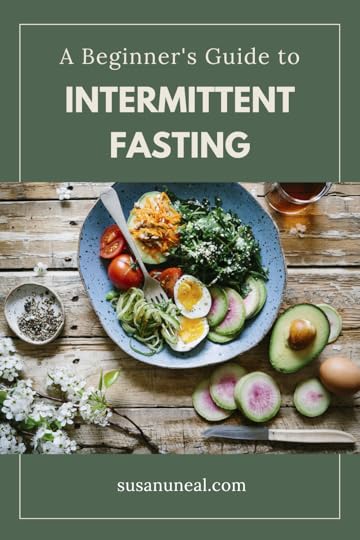
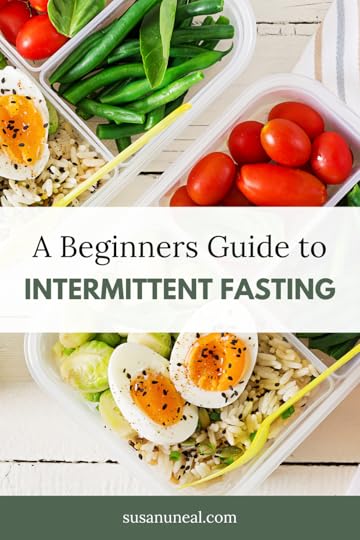
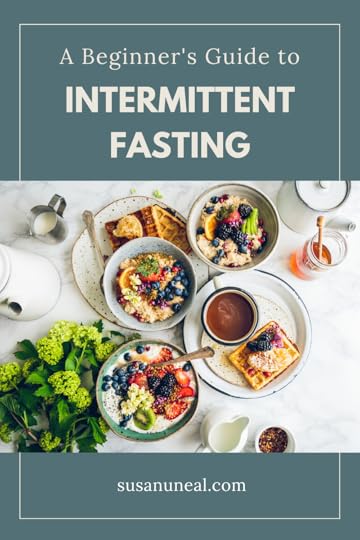
The post A Beginner’s Guide to Intermittent Fasting first appeared on .
December 13, 2021
How to Find Peace of Heart and Mind
Generally, we consider an active life as healthy. In the true sense, a healthy life is a life with peace of heart and mind. Sickness, poverty, disability, losses, and failures can disturb one’s peace. In comparison, a person can lead an unhealthy life, because of worries and dissatisfaction.
When one is not in good physical health, consulting a medical doctor is customary. With the vast knowledge on this subject, the doctor will question the person to gather information to understand the root cause of the sickness. While the patient may be prescribed medication, the general advice given may be to correct habits like sleep, diet, and exercise. When these positive lifestyle recommendations are followed, the person’s well-being improves. Many medical studies document that diet and exercise improve a person’s health.

However, there can be restlessness in one’s mental and spiritual life. Will a medical doctor pose a question like, “do you often get angry?” or “do you worry about your assets?” or “are you at peace, with your spouse or in-laws?” Usually a doctor does not ask these questions.
Some of our physical ailments can be caused by our thought life. But most of us ignore this. If we analyze our innermost reactions, we can recognize and correct whatever is out of alignment. Encountering stressful situations is a common factor for all of us. But through it all, we have to learn to find peace in our heart and soul.
Healthy thinking is vital for healthy living. In what areas do your thoughts turn negative? Do you have control of them? We need to make our life a blessing to others. We should treat others the way we expect others to treat us. It is vital to forgive and not have thoughts of taking revenge. We should even try to love our enemies, which is possible when we give our control over to God. Focusing on positive thoughts helps to balance our emotions, which in turn affects our physical well-being and good health.
Many of the areas in one’s life that a doctor cannot see, are taken care of in the Word of God. For example, anger, money, marriage, relationships, and giving. The Bible shows us the importance of controlling our cravings. We can crave to eat more, spend more, and so on than what we need. It is clearly mentioned in the Bible, that scripture is God-breathed and is meant for teaching and correcting. The Book of James in the Bible gives us brilliant advice.
James 1: 23–25, “Anyone who listens to the word but does not do what it says is like someone who looks at his face in a mirror and, after looking at himself, goes away and immediately forgets what he looks like. But the man who looks intently into the perfect law that gives freedom, and continues to do this, not forgetting what he has heard, but doing it–-he will be blessed in what he does.”
When the Bible is read with an attitude to obey, it will take root in that life and will not go back to the sender empty. Since we are concerned about living a healthy life, let us take responsibility to adapt a lifestyle with healthy boundaries.
Even if we know what to do, many of us do not do it. For example, a certain person read several books about the disadvantages of smoking, yet he continues to smoke, daily. To adapt a lifestyle with healthy boundaries, let us investigate what the Word of God instructs us to do. This practice will help us to balance our needs and cravings. Since God designed us with perfect health, if we allow ourselves to be guided by the Word of God, our inner life, including our thoughts, will be transformed to maintain a healthy life.
About the AuthorLilian De Silva lives in Sri Lanka. She had written three books—The Promised Messiah, Be An Overcomer and Sing with Me which are available on Amazon, under her full name–Lilian Elizabeth De Silva. She has presented the gospel over the national radio, TV, and on stage.
Pin for Later

 The post How to Find Peace of Heart and Mind first appeared on .
The post How to Find Peace of Heart and Mind first appeared on .



